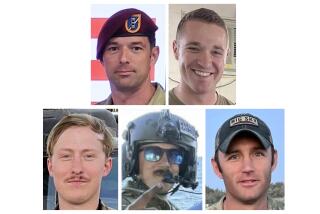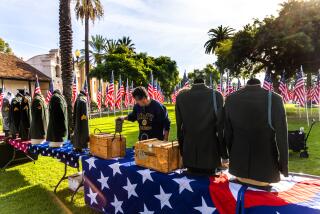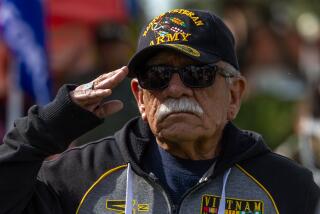Veteran makes sure others’ military service is recognized
They have no monetary value and little military cachet. Maybe that’s why many veterans never bother to collect the service awards they’ve earned.
But those ribbons and badges and medals — consigned to dustbins for decades by cloudy memories — can be important in ways beyond mere utility. They connect elderly veterans to their history and shore up fading legacies.
At least that’s what World War II veteran Art Peterson thinks. “Even if it’s nothing more than a Good Conduct Medal, that’s like for coming to work every day, it’s something you should have,” he said. “Not something that should be left undone.”
So Peterson, who served in the Navy from 1943 to 1946, has made it his mission to track down medals owed to military vets who live in his retirement complex in Granada Hills.
The process isn’t difficult or costly, just tedious, he said. With the right paperwork and a little patience, you can replace a missing medal for the cost of a restaurant meal.
The honors that veterans are entitled to are listed on their discharge papers. The medals can be ordered from military officials or purchased from Army-Navy stores.
The hardest part for Peterson was getting veterans to participate; it was “like pulling teeth,” he said. About two dozen reside at the Aegis Living senior center, but only six were willing to go through the process to land the medals they’d earned.
Some felt their service was so far behind them, the ribbons and badges don’t mean much anymore. Others don’t put much stock in memorabilia. And some either already had their awards or were afraid they hadn’t earned any at all.
As he got their paperwork in order, Peterson began pursuing more than service awards. He made regular trips with the men to the Veterans Administration center in North Hills to get all they were they entitled to: bigger pensions, better medical care, less expensive hearing aids.
The men didn’t have the expertise to navigate the rigmarole. So Peterson became their fixer, charming his way through VA red tape with small talk and jars of homemade jam.
That’s a fitting role for a man who spent years as a labor relations troubleshooter for Hughes Aircraft. At Aegis, he’s part cheerleader, part drill sergeant.
It took him almost two years, but he was able to connect four veterans with the medals they’d earned. One died during the search: former LAPD Officer Edwin Stivers, who’d received commendations for his service in the Air Force reserves.
The other men were honored Friday by their fellow residents. Their stories were shared, their medals displayed, their contributions finally recognized.
::
Former Navy gunner Joe Goldfarb had already received his four medals — “for the cost of a 3-cent stamp” — more than 60 years ago. He was discharged in 1947, after four years at sea. His biggest accomplishment, he told the crowd Friday, was getting home unharmed.
Air Force veteran Stanley Francis Olivier never knew he should have received two medals for service during the Korean War. He’d left college to enlist in 1951 and went back to school when his four-year hitch was up. From there, he earned a doctorate, joined the Peace Corps and traveled the world. “I had no idea about any medal,” he said. Service was its own reward.
It seems a travesty to me that so many veterans never got that tangible validation that a medal can provide. But mementos were low on the list of things that needed attending to as they returned from battlefields in Europe, Korea and Vietnam.
“There were too many things to think about,” said Samuel Shaner, who was drafted by the Air Force in 1943, two years after he graduated from North Hollywood High. He received three medals Friday, 68 years after he earned them.
“I just never bothered to get them after I was discharged,” he said. “I was too busy taking advantage of the GI Bill,” which paid his way through five years of college and led to an engineering career at Caltech.
Peterson already had collected four medals for his service in the South Pacific and Guadalcanal. But he hadn’t thought much about them until 20 years ago, when an emotion-filled moment at a family party introduced him to their value.
Peterson’s cousin, a World War II vet, had regaled the family for decades with stories of his combat heroics. “His children used to razz him about it, like they didn’t believe it,” Peterson said. Finally, a relative did a little digging, found his discharge papers and rounded up the medals that certified his valor.
When the cousin turned 80, the family held a party at Inglewood’s Proud Bird restaurant. His first gift was the collection of medals he’d earned but never touched.
They were mounted on velvet and displayed in a wooden frame. “He opened the package and broke into tears,” Peterson recalled. “There was dead silence in a room that had been all levity minutes before. He was amazed. His children were amazed. Their father was all the things he said he was. He left there walking 3 feet taller.
“That’s why I push these guys to get what they earned,” he said. “I’ve seen the impact it has. Sure, we had a lot of hoops to jump through.” But he’s already lining up a new crew and ready to do it again.
Twitter: @SandyBanksLAT
Military medals can be researched and ordered online at archives.gov.
More to Read
Start your day right
Sign up for Essential California for news, features and recommendations from the L.A. Times and beyond in your inbox six days a week.
You may occasionally receive promotional content from the Los Angeles Times.







